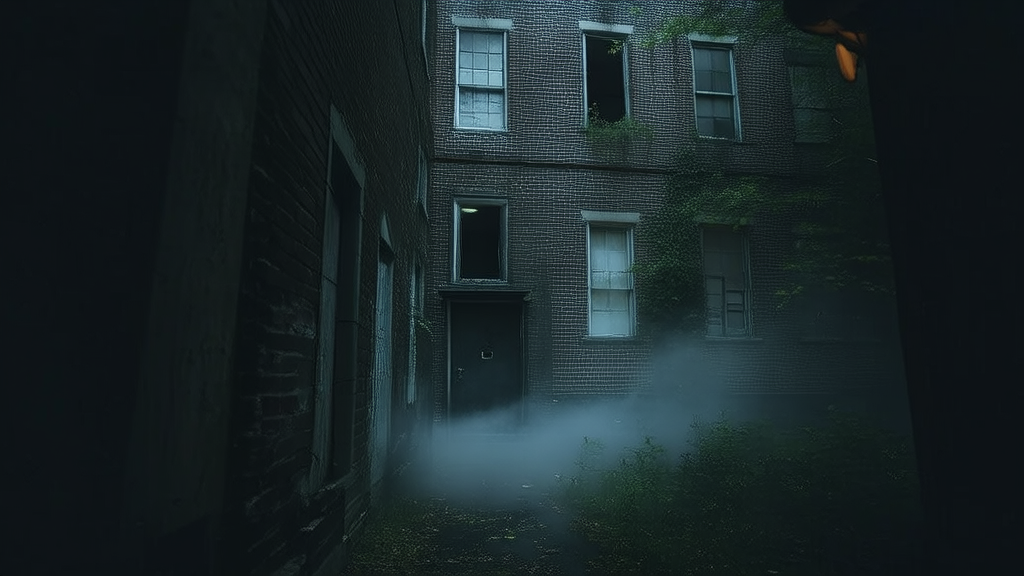🔮 Weird Tales & Urban Legends
The Whispering Walls of the Forgotten Building and the Architect Who Never Came Back

The old building on the edge of town had always been a place of quiet whispers. No one knew exactly when it was built, but the locals said it had stood there for over a century, its windows dark and its halls silent. Most people avoided it, but a few, like the young architect named Eli, found themselves drawn to its peculiar charm. The building wasn’t officially open to the public, but Eli had a key and a habit of wandering through its forgotten corridors late at night.
One evening, after finishing a long day of sketching plans for a new development, Eli found himself in the lobby of the old building. He noticed an elevator that hadn’t been used in years, its doors rusted and covered in dust. A small sign above it read, “Out of Service.” But something about it felt wrong. It wasn’t just old—it felt abandoned, as if time itself had forgotten it existed.
Curious, Eli pressed the button. There was a soft click, then a groan as the doors creaked open. Inside, the lights flickered once before settling into a dim, greenish glow. The air inside smelled faintly of mildew and something else—something metallic. He stepped inside, the doors closing behind him with a slow, deliberate motion.
The elevator began to move, but not upward or downward. Instead, it seemed to drift sideways, as if it were navigating a hidden corridor. The numbers on the panel didn’t match any floor he knew. One read “B2,” another “C1,” and then, suddenly, a number he couldn’t recognize. The walls of the elevator were lined with peeling paint, and the mirror reflected only his face—except when he turned his head slightly, the reflection showed someone else standing behind him.
He didn’t look again.
The elevator stopped with a jolt, and the doors opened onto what appeared to be a long, narrow hallway. The lighting was uneven, casting shadows that danced along the walls. At the end of the hall, a single door stood ajar, revealing a room filled with old office chairs and a desk covered in yellowed papers. On the desk sat a typewriter, its keys worn and cracked.
Eli stepped forward, drawn by the strange stillness. As he reached the desk, the typewriter clacked once, as if someone had just typed a letter. Then, a sound came from the other side of the room—a soft, rhythmic tapping, like fingers on a keyboard. He turned slowly, expecting to see no one, but the room was empty.
Back in the elevator, the numbers changed again. This time, they moved quickly, as if the machine was trying to escape. The doors closed, and the elevator shot upward, faster than it should have. When it finally stopped, the doors opened to a different floor—one Eli had never seen before. The hallway here was brighter, more modern, but the air felt colder, heavier.
At the far end, a man stood in the doorway of an office. He looked up, saw Eli, and smiled. “You’re late,” he said, his voice echoing strangely, as if coming from somewhere else. Before Eli could respond, the man turned and walked away, disappearing into the darkness.
The elevator doors began to close, but this time, they wouldn’t shut. A hand appeared from the outside, pressing against the door. It was pale, almost translucent, and it pushed the doors open just enough for a figure to slip inside. The person wore a tattered suit, their face obscured by a shadow. They stood silently, staring at Eli.
Then, without a word, they stepped out of the elevator and vanished down the hallway.
Eli stumbled back, heart pounding, and pressed the button for the ground floor. The elevator shuddered, then moved slowly, as if reluctant. When it finally arrived, the doors opened to the lobby, which was now completely empty. The building felt different now—darker, quieter, as if something had shifted.
He left the building that night, but the next morning, he found a letter on his desk. It was addressed to him, though he didn’t remember receiving it. The message was simple: *“You were never supposed to come back.”*
He tried to forget the experience, but the elevator haunted his thoughts. He searched for the building, hoping to find it again, but it was gone—replaced by a vacant lot overgrown with weeds. No one remembered it ever being there.
And yet, every now and then, when he stood in an elevator, he swore he heard the faint sound of a typewriter clicking in the distance.
Published on en
🔗
Related Sites
- AI Blog — AI trends and tech news